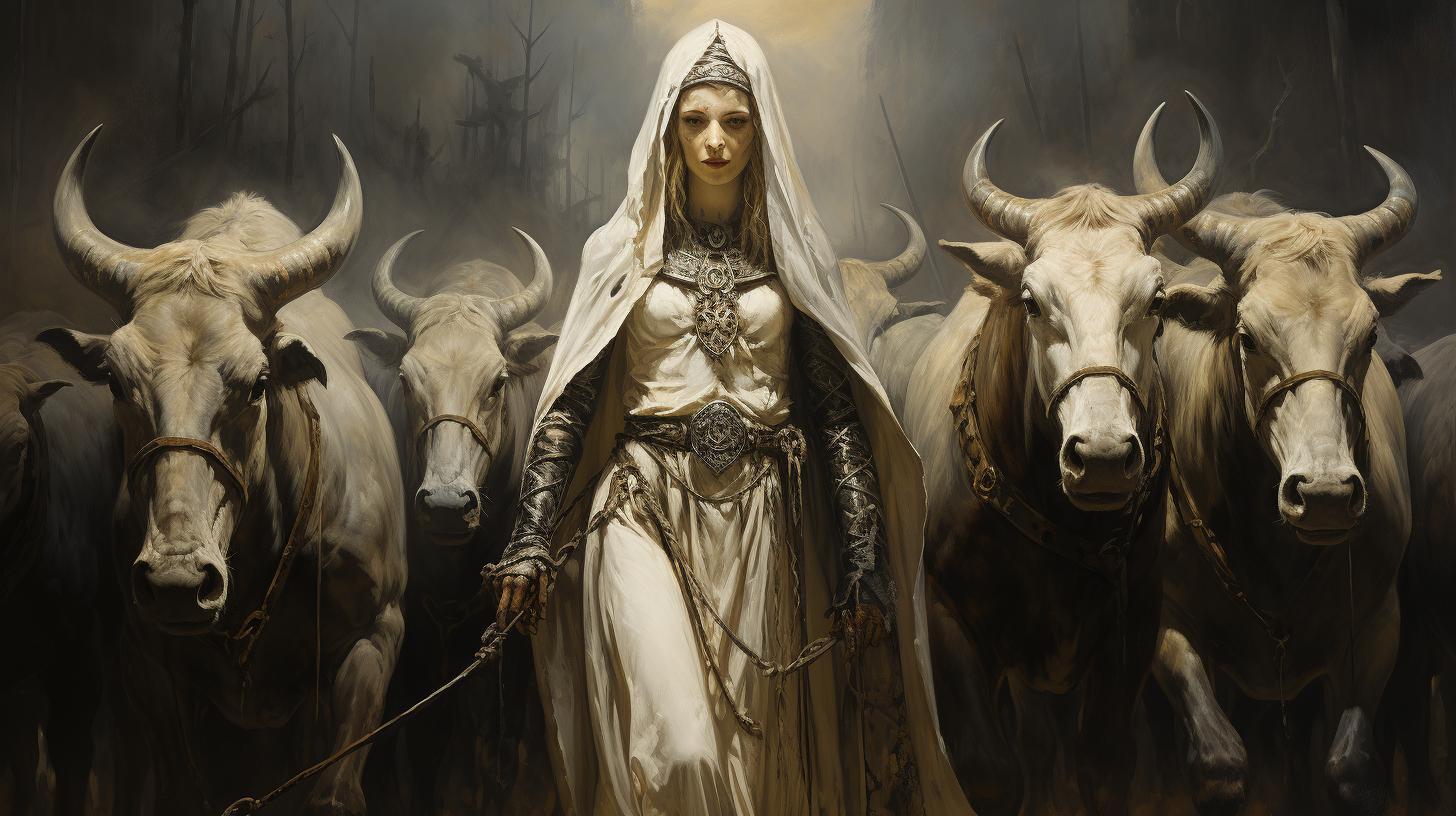Norse Goddess Sif: The Fertility and Power of Thor’s Enchanting Wife

Norse goddess Sif is a prominent figure in Norse mythology. She is known as Thor‘s wife and a deity of fertility. One famous tale revolves around Loki playing a mischievous prank by cutting off Sif’s golden hair, leading to Thor‘s fury.
To make amends, Loki replaces Sif’s hair with magical golden locks, triggering the creation of other enchanted objects like Thor‘s hammer. Referenced in the Poetic Edda and Prose Edda, Sif is believed to symbolize abundant golden wheat fields, representing her role as a fertility goddess.
Her significance lies in her connection to fertility and agricultural prosperity.
The Mythology of Norse Goddess Sif
Sif, a prominent figure in Norse mythology, holds a significant role within the ancient tales. Let’s explore her role in Norse mythology and her relationship with Thor.
Sif’s Role in Norse Mythology
In Norse mythology, Sif is revered as a goddess associated with fertility and abundance. She symbolizes the bountiful wheat fields and plays a crucial role in ensuring a prosperous harvest for the Norse people.
Sif’s presence brings forth blessings and the promise of fruitful lands.
Sif’s Relationship with Thor
Sif is best known as the beloved wife of Thor, the mighty god of thunder. Their union represents the harmony and balance between fertility and power, intertwining the forces necessary for a thriving society.
Together, they form a formidable pair within the pantheon of Norse gods.
The Story of Sif’s Hair
While some scholars interpret Sif’s golden hair as a representation of the fertile wheat fields, others argue that her significance extends beyond mere wifehood, emphasizing her connection to fertility and abundant agricultural yields.
In conclusion, Sif’s presence in Norse mythology is pivotal. She personifies the ideals of fertility and agricultural abundance, and her relationship with Thor displays the integrity of power and harmony essential for a flourishing world.
The Symbolism of Sif’s Golden Hair
Sif’s luxurious golden hair holds deep symbolism in Norse mythology, particularly representing fertility and abundance. It is believed to symbolize the bountiful golden fields of wheat, embodying the fruitful harvests that sustain the Viking people.
Sif’s Hair as a Representation of Fertility
Sif’s hair is closely associated with her role as a goddess of fertility. Its radiant golden hue reflects the vibrant and fertile nature of the earth, symbolizing the growth and abundance of crops needed to sustain the Norse communities.
The flowing locks represent the life-giving qualities of fertility, offering hope and prosperity to the Norse people.
Interpretations by Scholars and Experts
The significance of Sif’s golden hair has prompted various interpretations among scholars and experts. While some emphasize its connection to the agricultural fertility and prosperity, others argue that Sif’s role transcends merely being Thor‘s wife.
They see her hair as a representation of divine power and influence, representing the broader impact she has in the Norse pantheon.
Furthermore, some scholars suggest that Sif’s hair not only brings fertility to the fields but also symbolizes her own strength and allure as a goddess. Her hair’s beauty and magic are seen as a source of inspiration for artists and storytellers, captivating all who encounter her.
Overall, the interpretation of Sif’s golden hair showcases the multifaceted nature of her symbolism, deepening our understanding of her role and significance within Norse mythology.
- Sif’s hair symbolizes fertility and agricultural abundance
- Interpretations by scholars vary, emphasizing both divine power and attractiveness
- Her hair’s allure captivates artists and storytellers alike
Sif in Norse Literature and Prose
Sif, the Norse goddess of fertility, is prominently featured in the ancient texts known as the Poetic Edda and the Prose Edda.
These works offer valuable insights into her character, relationships, and role in Norse mythology.
References to Sif in the Poetic Edda
The Poetic Edda, composed around the 13th century, contains several mentions of Sif that shed light on her significance. In the epic poem “Lokasenna,” Loki insults Sif, emphasizing her infidelity in Thor‘s absence.
This suggests that Sif’s loyalty and faithfulness were considered vital aspects of her character.
In the poem “Sif’s Hair,” a lament is expressed for her shorn golden locks. This poem not only showcases Sif’s beauty but also emphasizes her association with fertility and the abundance of nature, hinting at the broader connotations behind her symbolic golden hair.
Mention of Sif in the Prose Edda
The Prose Edda, compiled by Snorri Sturluson in the 13th century, provides more extensive information about Sif’s role in Norse mythology. It describes her as Thor‘s wife and the mother of their daughter Thrud.
Though her primary depiction is confined to her relationship with Thor, her importance cannot be overlooked.
- The Prose Edda mentions how Loki, mischievous and cunning, cut off Sif’s hair, causing great distress to Thor. This event eventually leads to Loki‘s punishment and the creation of magical artifacts like Thor‘s legendary hammer, Mjölnir.
Sif’s story thus becomes intricately tied to the wider lore of Norse mythology.
- Furthermore, Sif’s association with fertility is reinforced in the Prose Edda when she’s referred to as “the fair giver of wealth,” emphasizing her role as a bestower of abundance and prosperity.
In summary, the Poetic Edda and the Prose Edda provide us with significant insights into Sif’s character and her place within Norse mythology.
While the Poetic Edda highlights her beauty and fertility, the Prose Edda further explores her relationship with Thor and the consequences of Loki‘s misdeeds. Sif’s enduring presence in these texts underscores her importance as a symbol of fertility and her significant role within the Norse pantheon.
Sif’s Association with Fertility and Abundance
Sif, the Norse goddess and wife of Thor, is closely associated with fertility and abundance in Norse mythology. She embodies the life-giving forces of nature and plays a significant role in ensuring the prosperity of the land and its people.
Sif as a Goddess of Fertility
As a goddess of fertility, Sif represents the vital energy that brings forth new life and sustains the cycles of growth. Her golden hair symbolizes the bountiful fields of golden wheat, representing the abundant harvest and the promise of sustenance for the Norse people.
She is revered for her ability to nurture and provide sustenance to the earth, ensuring the fertility of crops, the success of livestock, and the general well-being of the community. Sif’s presence brings forth a sense of abundance and prosperity for those who honor her.
Sif’s Connection to Agriculture and Harvest
Sif’s significance in Norse mythology extends to her association with agriculture and the harvest. She is regarded as the divine guardian of agriculture, overseeing the growth of crops and the productivity of the land.
- She watches over the planting and growth of crops, ensuring their successful development.
- Sif rewards the hard work and dedication of farmers with plentiful harvests, ensuring sustenance for the community.
- Her influence is particularly felt during the harvest season when she blesses the land with prosperity and abundance.
Through her connection to agriculture and the harvest, Sif assumes a crucial role in the well-being and prosperity of the ancient Norse civilization.
Her presence brings hope, abundance, and the assurance of a prosperous future for the community she protects.
Conclusion
Sif’s association with fertility and abundance in Norse mythology is a testament to her role as a divine guardian of the land and its people. As a goddess of fertility, she bestows the gift of fruitful harvests and sustains the cycles of life.
Her influence extends to the agricultural realm, ensuring the successful growth of crops and the prosperity of the community. Sif serves as a symbol of fertility, abundance, and the promise of a prosperous future for those who honor her.
The Importance of Sif in Norse Mythology
Sif’s significance in Norse mythology is evident through her crucial role within the family of gods and her influence on Norse heroes and beliefs.
Sif’s Role in the Family of Gods
As the wife of Thor, Sif holds an esteemed position among the gods. Her role as the goddess of fertility and abundance further enhances her importance within the divine family.
Sif’s association with agriculture and harvest resonates deeply with the agricultural society of ancient Norse communities, where the success of crops determined their survival.
Sif’s motherhood is also notable, as she is mentioned as the mother of Thrud and Ullr. This maternal connection emphasizes her role in shaping the next generation of gods and heroes, contributing to the continuation of Norse mythology.
Sif’s Influence on Norse Heroes and Beliefs
Sif’s mythological narratives have a profound impact on the lives of Norse heroes. The tale of her stolen hair and Loki‘s subsequent creation of magical golden locks plays a crucial role in the origin of Thor‘s mighty hammer, Mjolnir.
This powerful weapon becomes an emblem of Thor‘s strength and protection, shaping his identity as a hero in numerous Norse sagas and legends.
Moreover, Sif’s abundant golden hair serves as a symbol of fertility and prosperity, reflecting the interdependence between the natural world and human existence in Norse beliefs. The symbolism of her hair extends beyond mere aesthetics, embodying the importance of agricultural abundance and the cycle of life within the Norse cosmology.
Through her role within the family of gods and her influence on iconic Norse heroes and beliefs, Sif’s importance in Norse mythology cannot be understated. Her connection to fertility and agricultural prosperity highlights the significance of sustaining life in the ancient Norse understanding of the world.
….



















